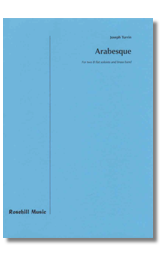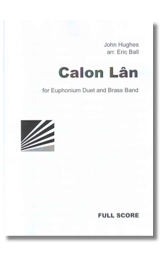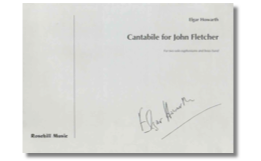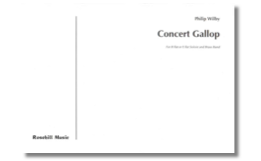Results
-
I Believe - Drake, Graham, Shirl & Stillman - Len Jenkins
"I Believe" is a popular song written by Ervin Drake, Irvin Graham, Jimmy Shirl and Al Stillman in 1953. It was commissioned with the intent of offering people hope and faith against the backdrop of the Korean War that followed so soon after World War 2. The number has been recorded by many artists and the edition by The Bachelors is perhaps the best well-known in Britain. This arrangement, which is very suitable for fetes and concerts, features the Flugel and Tenor Horns in a duet, with band accompaniment. It is dedicated to the twins Hazel and Heather who play these instruments in the Woburn Sands Band. Graham Cooper
-
 £39.95
£39.95Arabesque - Joseph Turrin
This showy duet was written for Robert and Nicholas Childs and is scored for any two B-flat soloists.
Estimated dispatch 7-9 working days
-
 £39.95
£39.95Calon Lan - Eric Ball
Eric Ball originally made this duet arrangement with piano accompaniment for inclusion in our album Czardas (order code 0078) and it was later transcribed for brass band by Eric Wilson (who was named after the composer!). The Welsh tune is handled in turn by the duettists, one embellishing while the other carries the melody. The accompaniment parts are not difficult making this delightful, somewhat nostalgic, piece ideal for bands of all abilities.
Estimated dispatch 7-9 working days
-
 £39.95
£39.95Cantabile for John Fletcher
This duet for two euphoniums and brass band is a heartfelt tribute to John Fletcher, the renowned tuba player whose life was tragically cut short.
Estimated dispatch 7-9 working days
-
 £49.95
£49.95Concert Gallop
Here is a charming, easy-going solo for all B-flat or E-flat brass instruments from the prolific Philip Wilby. This brass band version also comes with alternative solo parts for euphonium duet or trio and euphonium quartet (two baritones and two euphoniums).
Estimated dispatch 7-9 working days
-
£33.00
-
£35.00
Love Theme from Romeo and Juliet - Tchaikovsky, P - Harper, P
Adapted from Tchaikovsky's famous overture, this romantic duet features flugel and euphonium.2nd sectionDuration 3.30 minsListen to Helen and Glyn Williams with Cory Band on 'Summon the Heroes'Courtesy of World of Brass
In Stock: Estimated dispatch 1-3 working days
-
£33.00
To all the Girls I've Loved Before - David & Hammond - Broadbent, D
Probably one of the most popular ballads of recent years, arranged by Derek Broadbent as a trombone and euphonium duet (can easily be adapted for any other B-flat instrumentation).4th section +
In Stock: Estimated dispatch 1-3 working days
-
£33.00
Well, Did you Evah! - Porter, C - Somerset, G
Released in 1956, the Hollywood musical High Society was a musical remake of The Philadelphia Story. It had a star studded cast, including Frank Sinatra, Bing Crosby, Grace Kelly and Louis Armstrong (who played himself). Gavin Somerset's arrangement of Well, Did you Evah! faithfully reproduces the famous Crosby/Sinatra duet for two euphoniums. Entertainment at its best!!4th section +
In Stock: Estimated dispatch 1-3 working days
-
£33.00
Forest Warblers - Rimmer, W
Duet for two CornetsWith full band set (score not available)
In Stock: Estimated dispatch 1-3 working days
